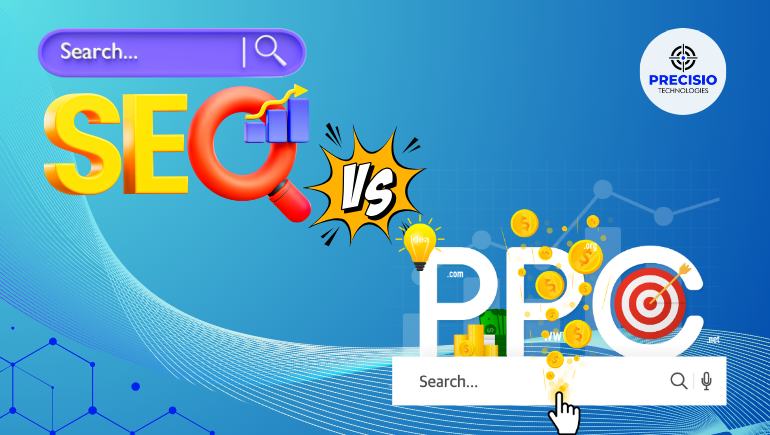
In today’s digital world, businesses have two powerful tools at their disposal to increase online visibility and attract customers: Pay-per-click (PPC) and Search Engine Optimization (SEO). But how do you make the right choice for your business? In this blog, we’ll explore PPC and SEO and address key questions to help you decide which strategy is best suited for your unique needs.
What exactly are PPC and SEO?
PPC (Pay Per Click): PPC is a digital advertising method where businesses pay a fee each time a user clicks on their online advertisement. These ads usually appear at the top or side of search engine results pages (SERPs) and are typically labelled as ‘sponsored.’
SEO (Search Engine Optimization): SEO is the practice of optimizing your website to enhance its visibility in organic (non-paid) search results. It involves various techniques to improve your website’s ranking on search engines like Google.
What are your immediate objectives?
PPC: If your primary goal is to quickly generate targeted traffic to your website and see instant results, then PPC could be the right choice. PPC campaigns can be set up and launched within a short period, making them ideal for time-sensitive promotions.
SEO: On the other hand, if you’re aiming for long-term, sustainable growth and are willing to invest time and effort upfront, SEO is the way to go. Building a solid organic online presence takes time, but the benefits are long-lasting and cost-effective over time.
How much is your budget?
PPC: It’s essential to note that PPC can be costly, particularly for competitive keywords. You will need to establish a daily or monthly budget for your PPC campaigns. Keep in mind that you pay for each click, whether it results in a conversion or not.
SEO: SEO typically involves an initial investment in terms of content creation, technical optimizations, and potentially hiring an SEO specialist. The long-term cost of this approach, however, is generally lower. Once you rank well for relevant keywords, the traffic you receive is essentially free.
How competitive is your industry?
PPC: In highly competitive industries, the cost of PPC advertising can soar. If your business operates in a niche where numerous competitors are bidding for the same keywords, you might require a substantial budget to compete effectively.
SEO: SEO can level the playing field. Even in competitive niches, a well-executed SEO strategy can help your website rank alongside established players, as long as you’re willing to put in the effort and remain committed.
Are you targeting local or global audiences?
PPC: PPC allows you to target specific geographic locations, making it effective for businesses focusing on local audiences. You can configure your ads to appear only to users in particular regions or cities.
SEO: SEO is equally effective for local and global targeting. For local audiences, you can implement local SEO strategies, such as optimizing for ‘near me’ searches and creating a Google My Business listing to attract nearby customers.
What’s your brand awareness strategy?
PPC: If your brand is relatively new or not well-known, PPC can help you gain immediate visibility. Well-crafted PPC ads can place your business at the top of search results, giving you exposure even before your SEO efforts start producing results.
SEO: SEO is excellent for building long-term brand authority. Over time, as you consistently produce valuable content and optimize your website, you’ll naturally gain credibility and recognition in your industry.
How much control do you desire?
PPC: PPC offers precise control over your ad campaigns. You can make real-time adjustments to budgets, targeting criteria, ad copy, and landing pages, allowing you to swiftly respond to changing market conditions.
SEO: While SEO gives you control over your website’s content and structure, it is subject to search engine algorithms, which can change frequently. SEO demands patience and a long-term perspective.
What’s your conversion strategy?
PPC: If your primary objective is to generate immediate sales or conversions, PPC can provide a direct path to achieving this goal. You can create ad campaigns optimized for conversions and closely monitor results.
SEO: SEO is better suited for businesses with broader conversion strategies, such as lead generation, content marketing, or building an email list. It helps you attract and nurture prospects over time.
Conclusion
When it comes to deciding between PPC and SEO, there is no one-size-fits-all answer. Your choice should align with your specific business goals, budget, competitive landscape, and long-term vision. Some businesses find success in combining both strategies to maximize their online presence. Remember that PPC can deliver quick wins, while SEO offers sustainable growth. Ultimately, your decision should reflect your unique circumstances and objectives. Regardless of the path you choose, consistent monitoring and optimization of your digital marketing efforts are essential in the ever-evolving online world.
